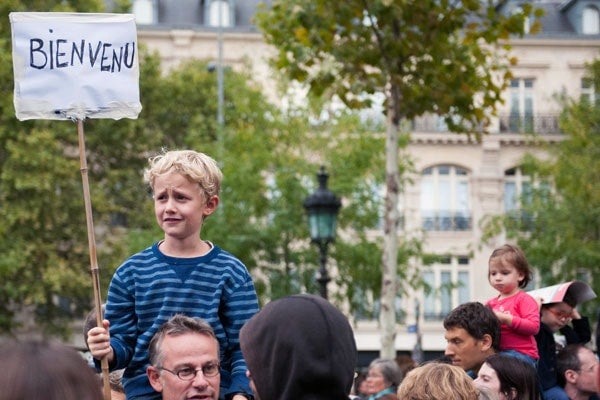
Refugees, national security and morality – Munk panel debates the issues before the Paris attacks
Published: November 16, 2015
Did one of the perpetrators of the Paris terrorist attacks get into the country by posing as a Syrian refugee? That’s one of the questions being posed this week, along with broader issues about the balance between compassion and national security.
Those questions were also debated last week by a panel of prominent thinkers at the Munk School of Global Affairs.
The panelists – including acclaimed international jurist Louise Arbour and World Vision Canada executive director Elly Vandenberg – were participating in a two-day event called Global Justice, jointly hosted by Munk and CBC Ideas. Also participating were Catherine Dauvergne, dean of law at the University of British Columbia and philosopher Michael Blake from the University of Washington.
Munk Director Stephen Toope moderated the discussion, which will be broadcast on Ideas on December 21 and 22.
The two-night symposium ended the day before the attacks in Paris, but the issues debated – where the obligation to help migrants begins and ends and how to protect human rights in a world of conflict – took on extra significance after the attacks.
Arbour, a former justice of the Supreme Court of Canada, former UN High Commissioner for Human Rights and international prosecutor of war crimes, insisted that people with a deliberate aim of destroying Canada are not knocking on the country’s borders in great numbers.
“Should we be concerned that people will come here and advocate for a different way of life, for different religious affiliations?” she asked. “Yes, I think that’s what democracy’s all about. But why are we always talking about the danger that these people will transform us? Well, they may transform us for the better. It’s a process of mutual transformation that is the richness of our democratic model.”
But, she continued, “if we’re talking about this evil person at the border coming to destroy Canada, I don’t think we should let him in, but I don’t think that’s a real question. That question feeds the politics of fear and is usually put forward to hide a much more cynical agenda of rejection and exclusion.”
Blake argued that countries do have legitimate grounds for excluding some migrants and refugee claimants. “It’s not that I think we should be selfish bigots who want to keep out others, but the world is full of people are less than angelic in their willingness to play nicely with others.”
If violent events happen because refugees are admitted, it feeds support for extreme right-wing groups like in Germany or France, he said. “Just because everyone on this stage is a nice squishy liberal, it doesn’t follow that the planet is populated by nice squishy liberals. We can’t expect that through law we can make the whole world as virtuous as we are.”
Toope pointed out that the current refugee crisis is not just a European problem. “Right now about 60 million people are displaced in countries all around the world – Kenya, Ethiopia, Thailand, Turkey and the U.S. are all struggling with waves of people crossing their borders. We are living in a time of mass migration, but in the world that we’ve constructed, migrants cannot go and live wherever they want.”
(Below, from left: Catherine Dauvergne, Michael Blake, Louise Arbour, Stephen Toope /photo by Lisa Sakulensky)

Dauvergne agreed that the refugee crisis is a worldwide issue. People in the west are now paying attention because some of the refugees are coming to Europe, but other nations have been trying to cope with refugees for years. For example, one of the largest refugee camps is Dadaab in Kenya, which was created in 1992 and houses more than 300,000 Somali refugees. And Europe isn’t even bearing the brunt of the Syrian displacement, she said.
“If we think about where people displaced from Syria have gone, Lebanon is host to 4.5 million, Jordan has about 4 million and there are actually a comparatively small number of people who are reaching Europe. So what’s different about Europe? Well one of the big differences is that European states have military might and state capacity and they could actually close the borders.”
Arbour warned that Canada and other western countries do not have a choice about accepting more refugees and other migrants.
“We have to face up to realities. It’s not a question of whether we can survive the influx or tolerate it. The alternative is not sustainable. The alternative of building walls and locking the doors is not realistic.”
However, she concluded, most refugees, whether political or economic, are not coming to the west to cause trouble or become economic parasites. “They come in looking for work; they’re seeking a better life.”



